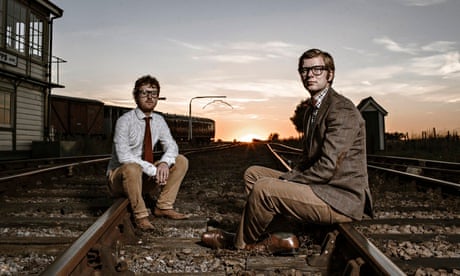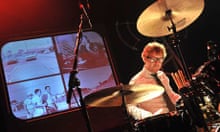It's a wet morning in London when one of the men behind Public Service Broadcasting comes splashing through the rain into a restaurant housed in a massive old grain store just north of King's Cross station. John, as he introduces himself, is unremarkable in an old pair of jeans and a white shirt, undone at the collar. He orders a pot of tea. Normally at this time he's taking his tea to the freezing garage that serves as his makeshift studio across town in south-east London. There, he sifts through archive footage from film and radio broadcasts, picking bits of dialogue to set to music that slips between krautrock, synth-pop and cinematic post-rock reminiscent of British Sea Power. For live shows, John dons a bowtie and tweed to become J Willgoose Esq, a character who exists somewhere between Doctor Who and the kind of history teacher whose halitosis travels round corners. With his drummer Wrigglesworth by his side, Willgoose is a wacky professor diving into the past like Mary Poppins did with puddles, breathing new life into old recordings.
Though PSB now say their mission is to "teach the lessons of the past through the music of the present", Willgoose first started using samples simply because he didn't want to sing. "Singing is never going to work. I'm not going to be happy with it, I'm not going to be comfortable playing it to other people," he explains. Inspired by DJ Shadow, Unkle, and the Manic Street Preachers album The Holy Bible, Willgoose started making what he calls frivolous attempts at sampling over a decade ago. As the samples began to shape the direction on the songs themselves, he realised he'd have to learn the stories behind them. "The interest in the historical side came purely from a sound perspective," he explains. "I wanted something with a bit of character and history and weight behind it."
The formula has proven popular. Last year, PSB played 150 shows and released a debut album, Inform-Educate-Entertain, based on public information films, that reached No 21 in the charts. They supported Manic Street Preachers on tour and played the William's Green stage at Glastonbury to such an enormous reaction he fears they might never be able to top it. If they're going to, they've got to answer the critics who believe the formula has insurmountable limitations. "I'm confident that we can prove a lot of people who think we're a short-lived dead-end project wrong," Willgoose says. "A lot people give us quite a lot of credit for doing things slightly differently and then they assume we've got to this point now and that's it. Do you say to the lead singer of a band: 'What's going to happen when you run out of words?'"
Archive material certainly isn't in short supply. PSB have a good relationship with the British Film Institute, which is keen to let the band bring its archives to a bigger audience (as well as sampling the dialogue for their recordings, the PSB live show features extensive use of the films themselves), and it's easier than ever to find new footage to use now that so much of it is being digitised. "I'm not worried about the concept," Willgoose says. "I'm worried that the music is not going to be good enough, basically."
'We're about using the technology of the day to take stuff from the past and recontextualise it in the present, rather than being some kind of retro throwback'
This article includes content provided by Spotify. We ask for your permission before anything is loaded, as they may be using cookies and other technologies. To view this content, click 'Allow and continue'.
But relying on samples, rather than words, can be a tricky business, especially when Willgoose isn't setting out to soundtrack history but rather to find bits to fit his songs. Often the samples can take on a different meaning entirely in their new context. On 22 May last year, the day Lee Rigby was murdered in Woolwich, PSB played a show at the Village Underground in London, opening with London Can Take It. Over brooding strings and a dark, synth pulse came the voice of Quentin Reynolds in Humphrey Jennings's 1940 propaganda broadcast: "The sign of a great fighter is, can he get up from the floor after being knocked down? London does this every morning. There is no panic, despair or fear in London town."
"It did feel oddly appropriate," Willgoose says. "Sometimes the original meaning of the film translates forward like that, but others you have a more ironic or slightly detached translation." On Lit Up, Willgoose uses shimmering synths to lend majesty to a 1937 broadcast by Thomas Woodrooffe, who was so sloshed at the time he had to be taken off air. Signal 30, which takes its name from a notorious American road safety film from the 50s, is a rampant, Wacky Races collage of pounding drums and screaming tyres, while Spitfire, which seems at first like a rousing tribute to the triumph of British engineering over the Germans, is set to krautrock. "There is a subversion of sorts going on with it," Willgoose says. "We're about using the technology of the day to take stuff from the past and recontextualise it in the present, rather than being some kind of retro-throwback to some bygone age when Britain was great."
Whether the audience gets the gags is the one thing PSB can't control. The costumes are supposed to add to the appeal, as is the computer-generated voice Willgoose uses to communicate at shows. And, though they used the Lord Reith's mission statement for the BBC as their album title, Willgoose says they don't profess to do a great deal of informing or educating. "It's entertainment first," he says. "It's quite a snappy title, though."



Comments (…)
Sign in or create your Guardian account to join the discussion